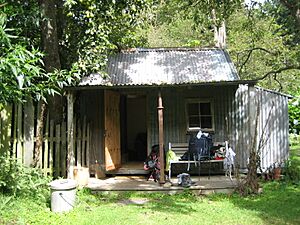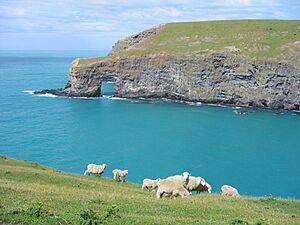Banks Track facts for kids
The Banks Track is a super cool walking trail in New Zealand. It's about 30 kilometers long and is found on the Banks Peninsula in the South Island. This track first opened in 1989. It was special because it was the very first walking trail in New Zealand owned by private people, not the government!
Contents
Walking the Banks Track
You can walk this track from October to April each year. The places you stay overnight, called huts, are really special and have everything you need.
The Trail's Path
The Banks Track offers two choices: a two-day walk or a three-day walk. Both options begin and end in a town called Akaroa. The highest point on the track is 699 meters (about 2,293 feet) high. As you walk, you'll see a mix of rugged coastlines, thick forests, open pastures, and the beautiful Hinewai Reserve.
Here are the main parts of the track:
- From Onuku Farm (near Akaroa) to Flea Bay Cottage (11 kilometers)
- From Flea Bay Cottage to Stony Bay Cottage (8 kilometers)
- From Stony Bay Cottage back to Akaroa (11 kilometers)
Plants and Animals You Might See
While exploring the Banks Track, keep an eye out for amazing wildlife! You might spot yellow-eyed penguins, little penguins, and different types of seabirds like spotted shags and sooty shearwaters. If you're lucky, you could even see fur seals and Hector's dolphins playing in the water.
The track also goes through areas with unique plants. Look for tall nikau palms, huge kahikatea trees, and many kinds of tree ferns.
How the Track Helps Nature and People
The Banks Track is a great example of ecotourism. This means it's a way to enjoy nature while also helping to protect it and support local communities.
The track was started by ten different landowners, most of whom were farmers. In the 1980s, farmers faced tough times because of dry weather and changes in government help. So, they decided to open their land for walkers to earn extra money.
They created a special company to manage the track. In return for letting people walk on their land, helping with track upkeep, and providing places to stay, the landowners get paid each year. How much they get depends on things like how much of their land the track crosses and how much they help with running the track. This way, the Banks Track helps both nature and the people who live there.
 | John T. Biggers |
 | Thomas Blackshear |
 | Mark Bradford |
 | Beverly Buchanan |



